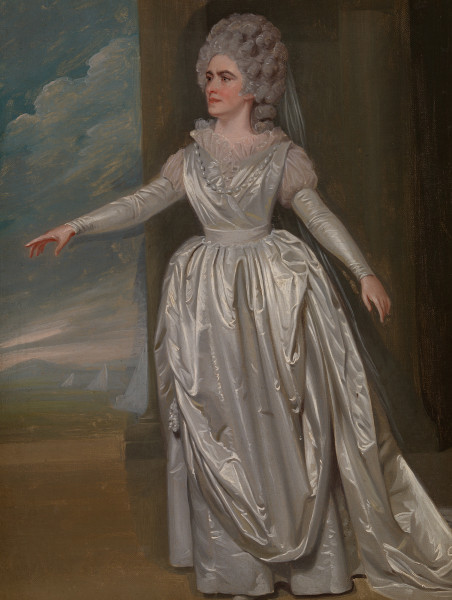Home
/
G0833
Paintings: G0833
Title
Sarah Ward
Technique
Oil on canvas
Subject
Character
Octavia : All for Love or The World Well Lost
Artist
Dimensions
Height: 37cm
Width: 28.4cm
height (frame): 46cm
width (frame): 37cm
Width: 28.4cm
height (frame): 46cm
width (frame): 37cm
Provenance
John Bell; Thomas Harris; Harris sale, 12 July 1819 (66); Charles Mathews
Other number
Mathews 380
RW/CKA 269
RW/CKA 269
Exhibition history
1833 London, Queen's Bazaar, Oxford Street, "Mr Mathews's Gallery of Theatrical Portraits" (380)
Engraving history
Philippe Audinet for Bell's British Library 24 March 1792, line 11.25 x 8.05 pub. Bell's “British Theatre” (1797) vol 16
In Act III of Dryden's answer to Shakespeare's “Antony and Cleopatra” there is a marvellous confrontation scene between Octavia (Antony's second wife and Caesar Augustus's sister) and Cleopatra. It follows the arrival of Octavia with her two little daughters in Egypt to plead for Antony's return to the Roman camp. Octavia recognises Cleopatra by her "haughty carriage." Cleopatra retorts that her haughty carriage "shows I am a queen. Nor need I ask who you are." Octavia replies with the line quoted on the engraving: "A Roman: A name that makes and can unmake a Queen" In the Bell edition it is noted that that whole scene was "omitted in the Representation." Whether or not the actress ever said the lines, the pose is noble and declamatory. Octavia wears a long-sleeved silver dress and underskirt, with a silver belt and stiffened lace collar, and a single strand of large white beads. A veil falls from the back of her head.
Dryden's tragedy was originally staged at Drury Lane on 12 December 1677. Mrs Ward first played the role in London on 13 November 1780, at Drury Lane. For Mrs Siddons's benefit on 5 May 1788 she acted Octavia to Mrs Siddons's Cleopatra and J. P. Kemble's Antony. That performance was the last before De Wilde painted his picture.
This Sarah Ward (née Hoare) - not to be confused with the actress who married Roger Kemble - became the wife of the Manchester actor-manager Thomas Achurch Ward (1747-1835). She played many leading roles at Drury Lane, including Juliet, Zara in “The Mourning Bride”, Millwood in “The London Merchant”, the Queen in “Hamlet” and "Cymbeline", Jane Shore, and Mrs Oakly in “The Jealous Wife”. After 1793, she joined her husband in Manchester and remained a mainstay of the company until 1812.
Dryden's tragedy was originally staged at Drury Lane on 12 December 1677. Mrs Ward first played the role in London on 13 November 1780, at Drury Lane. For Mrs Siddons's benefit on 5 May 1788 she acted Octavia to Mrs Siddons's Cleopatra and J. P. Kemble's Antony. That performance was the last before De Wilde painted his picture.
This Sarah Ward (née Hoare) - not to be confused with the actress who married Roger Kemble - became the wife of the Manchester actor-manager Thomas Achurch Ward (1747-1835). She played many leading roles at Drury Lane, including Juliet, Zara in “The Mourning Bride”, Millwood in “The London Merchant”, the Queen in “Hamlet” and "Cymbeline", Jane Shore, and Mrs Oakly in “The Jealous Wife”. After 1793, she joined her husband in Manchester and remained a mainstay of the company until 1812.

